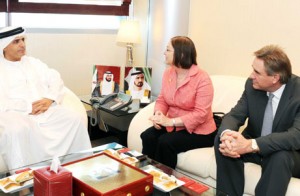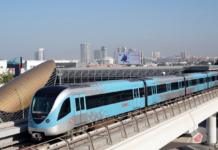Source: www.ameinfo.com
H.E. Mattar Al Tayer, Chairman of the Board and Executive Director of Roads and Transport Authority (RTA) in Dubai, has recently received a visiting delegation from the British Institution of Civil Engineers (ICE).

The delegation was headed by Mrs Jean Venables, President of ICE, and included Mr. Tim Askew, and Managing Director of WS Atkins ME&I, Mr Crighton (ICE UK), in addition to ICE UAE Event Organizing Team comprising of Alaa Albanaa, Bob Eves, and Mark Jamieson.
In the outset of the meeting Al Tayer welcomed the delegation of the British Institution of Civil Engineers and praised the role of the British companies which operated in the UAE long ago and participated in designing & constructing several roads, bridges and tunnels in the UAE, particularly in Dubai.
Al Tayer said:
“We are looking forward for more cooperation between engineers in the UAE and their counterparts in the UK in exchanging expertise and knowledge to upgrade the engineering practices in both countries. This is particularly relevant under the accelerating development of infrastructure projects in the UAE spanning public transport, rail, tram and marine transport systems.”
RTA Chairman briefed the British delegation on the Dubai Metro project, the first phase of which was opened on 09/09 and the metro could serve about 1.5 million passengers between 10 stations in a month time. Dubai Metro is the world’s longest automated driverless train constructed as one project. It comprises two lines; the Red Line: extending 52 km connecting 29 stations (4 underground stations: Al Ittihad, Khalid bin Al Waleed, Riqqa and Port Saeed), and the Green Line: extending 23 km connecting 18 stations, including 6 underground stations.
While constructing Dubai Metro Project RTA managed to overcome several challenges such as delivering the project on schedule i.e. in about 4 years period; which is a record period as completion of such projects usually requires about 3 folds this period. The project complies with the highest global safety standards and the services of world-class institutions have been sought to assess the safety standards of all phases of construction, accordingly the project recorded an accident rate less than the international rate which is one case per one million working hours. The project uses state-of-the-art rail technology and provides all means of comfort and luxury to passengers.
For its part, the delegation of the British Institution of Civil Engineers congratulated RTA on the launch of Dubai Metro; which has redefined transport systems in the region and added a beautiful dimension to the host of exclusive projects witnessed by Dubai, besides contributing to transportation of commuters and easing traffic congestion in the emirate.
Afterwards, an introductory tour of Dubai Metro was arranged for the delegation during which it was accompanied by the Acting CEO of Rail Agency Adnan Al Hamadi, Director of Operations Dep’t Ramadan Abdullah Mohammed, Director of Rail Planning & Development Abdul Rida Abu Al Hassan, and the Manager of Office of the CEO of Rail Agency Nasir Al Bahri. The tour covered several metro stations; namely Al Rashidiya Station, Terminal 3 of Dubai International Airport Station, Al Ittihad Station, Khalid bin Al Waleed Station, and Mall of the Emirates Station.
Al Hamadi gave the visitors a brief account of Dubai Metro highlighting the key elements of the project which is environment-friendly, and designed to fully comply with security & safety at top quality standards. He commented on the metro stations which have a unique design that forms a blend of modernity and authenticity. Stations comprise two major groups: underground stations and elevated stations. The external design of roofs is inspired by the shape of the shell, and the internal design of the stations replicates the four elements of nature: water, air, fire and earth; while Al Ras & Al Ghubaiba stations have heritage-inspired designs. The stations provide the sort of amenities and services needed by metro users such as the commercial outlets, restaurants and waiting areas.
Al Hamadi added that Rail Agency focuses on several key aspects based on the principle of integration of all elements which includes increasing the capacity of public transport modes through expanding the existing network and upgrading mass transit modes to provide top quality transport systems that meet the requirements of various segments of the community.



















